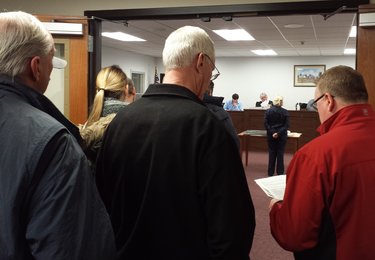Some support, many object to Elliott’s plans for Feura Bush party venue
NEW SCOTLAND — Neighbors came out in force Tuesday to protest, or support, an event venue proposed by former planning board member Cynthia Elliott for her property in Feura Bush.
“You’re looking at the applicant. You need to look at the land,” Elliott, a sometimes controversial figure in town planning, told the board, likening the interest in her application to the famous Hatfield and McCoy feud.
Opponents said that noise from parties, and drunk drivers leaving events, could affect their neighborhood.
A standing-room-only crowd of 50 attended a 90-minute public hearing, continued from November and December, for Elliott’s request for a special-use permit to open two seasonal businesses on her residential property. Discussion also centered on whether or not the town could limit the proposed use to the length of Elliott’s ownership of the property — a limit Elliott insisted was unheard of in the region.
Elliott wants to replant her mother’s tree farm, formerly known as Scotch Hill Acres, on property she now owns and lives on at Brownrigg Road in Feura Bush. She and her family applied, as Triple S Farm, for the permit in the residential agricultural zone to allow her to sell wreaths, boughs, and trees at the farm’s existing pavilion in the winter.
Elliott wants to use the enclosed pavilion, which has kitchen and bathroom facilities and water, as an outdoor banquet facility during the tree farm’s off season.
She told the board that she got the idea after hosting family weddings there, and two political fundraisers, “which probably got me into trouble, but that’s all right.”
“This is to be more exclusive,” Elliott told one neighbor who asked about signs at the road. The venue, she said, would not be too commercial, and could host corporate retreats or baby showers.
“Forty people inside a pavilion is not going to have an impact, whatsoever,” Elliott said of baby shower attendees.
Her neighbor, Pete Farrell, told the board he does not object to the proposed businesses.
“She’s had parties. I’ve never heard them,” Farrell said. “I’m all for it.”
Another neighbor, Bill Gregory, speaking for several residents, said that the street has a couple of businesses already, but little traffic. The group he represented was concerned about drunks driving on the gravel road, he said.
“It doesn’t seem to fit ‘residential,’” Gregory said of the proposal.
More than one resident said that they can hear Elliott’s dog barking, but one also said he, too, had dogs that bark.
One resident said that drunk people park cars on lawns and are hard to manage. He asked the board to consider intoxicated drivers and a “small kid” at a nearby bus stop. Another suggested that party-goers do indecent acts.
Other residents asked if the permit, if granted, would be passed on to the next landowner without restriction if Elliott no longer owned the property.
Planning board Chairman Charles Voss told the audience that restrictions to the application would stay with the property even if the land changed hands, as long as the use was not discontinued.
The current application is to hold special events from May to October, about three times per month. The site would follow the town’s 2006 noise law and stop all music at 11 p.m., Elliott previously said; guests would be served by caterers with certified bartenders.

One of Elliott’s supporters scoffed at worries about indecent acts on the property.
“I don’t know what kinds of weddings y’all go to, but no indecent things” are at the weddings she attends, she said. She also argued against noise complaints, stating that chainsaws, fireworks at holidays, and snowmobiles are louder than music in Elliott’s enclosed pavilion. A chainsaw is 120 decibels.
“This is a very quiet residential area,” countered another neighbor.
The planning board asked Elliott to return in February with a noise study.
“We’re looking for a generalized study,” Voss said.
Elliott said that the venue would be busy for only 45 hours per year, due to weather, as the pavilion is not insulated.
“This is not to be a tavern. It is to be closed. Music, if any, is contained,” Elliott said. “It’s fully enclosed.”
She said that 45 hours per year is one percent of annual time; “Ninety-nine-percent of the time, it’s not even happening, because it can’t,” she said.
“I can do a sound study,” Elliott agreed, but she urged the board to “realistically” think about its need. She said she could try to get the noise level inside the pavilion up to 110 decibels, and step outside to hear and measure it.
“We are introducing a new element to this neighborhood,” Voss said, noting that the board is considering “potential disturbances” in the area.
Planning board attorney Jeffrey Baker said that town code will require a regulation handicapped-accessible restroom at the pavilion.

